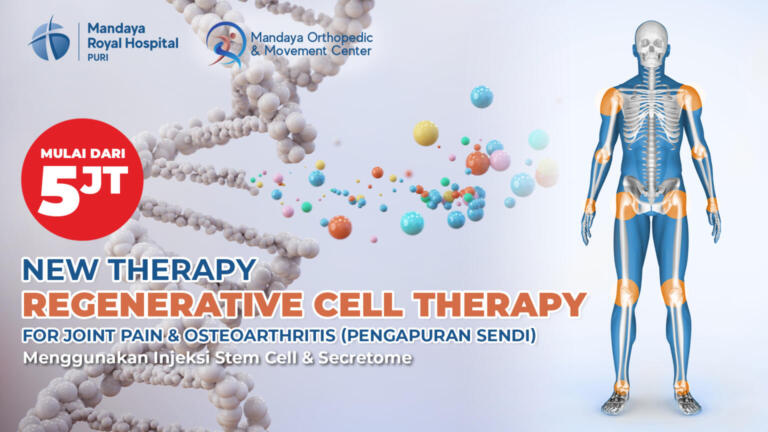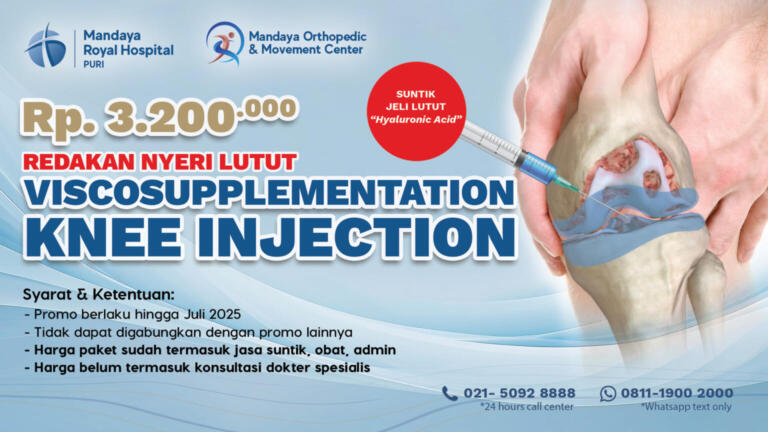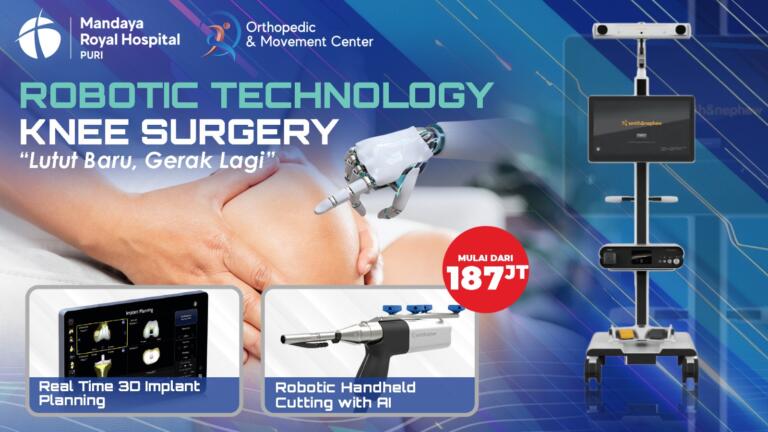Knee osteoarthritis is one of the most common joint problems, especially among adults and the elderly. This condition is marked by the thinning of the cartilage in the knee joint, causing pain, stiffness, and limited movement. If left untreated, osteoarthritis can worsen and significantly disrupt daily activities.
Knee osteoarthritis is classified into four grades. Each grade reflects the level of joint damage, from mild to severe. Understanding these grades helps both patients and doctors determine the most appropriate treatment plan.
At RS Mandaya Royal Puri, knee osteoarthritis is treated by orthopedic specialists with a subspecialty in hip & knee, including dr. William Chandra, Sp.OT (K) Hip & Knee. He provides detailed explanations of each grade of osteoarthritis and offers modern medical solutions tailored to the needs of each patient.
Contents
Knee Osteoarthritis Grades and Severity
-
Grade 1
In grade 1 osteoarthritis, small bone spurs called osteophytes begin to form. Osteophytes are abnormal bone growths that typically develop where bones meet within a joint. This occurs as the body’s response to cartilage thinning or damage. At this early stage, patients usually do not feel significant pain or symptoms, since the joint damage is still minimal.
-
Grade 2
Grade 2 osteoarthritis is considered mild. X-rays may show larger osteophytes, but cartilage remains relatively healthy, and there is still sufficient space between bones without direct friction. Early symptoms may appear, such as pain after long walks or running, joint stiffness after inactivity, and discomfort when bending or kneeling.
“For grade 1 or 2, treatment can be done without surgery, such as lifestyle modification, weight loss, pain or anti-inflammatory medications, physiotherapy, braces, or injections,” explains dr. William.
“There are many options to try before surgery becomes necessary,” he adds.
-
Grade 3
Grade 3 osteoarthritis is categorized as moderate. Cartilage damage becomes more evident, and the space between bones narrows. Symptoms like pain when walking, running, bending, or kneeling become more frequent. Joint stiffness is also common after sitting for long periods or upon waking in the morning. Swelling in the knee may occur after heavy activity.
-
Grade 4
Grade 4 is the severe stage of osteoarthritis. Patients experience intense pain and discomfort almost every time they move the knee. The joint space is very narrow, cartilage is nearly worn away, and the knee becomes stiff and hard to move.
The lubricating synovial fluid also decreases significantly, causing bones to grind directly against each other. This leads to severe pain, restricted movement, and difficulty performing daily activities.
“Typically, surgery is recommended for grade 3 and 4 cases, when other treatments no longer provide relief. That’s when we start considering surgical options,” says dr. William.
Osteoarthritis Treatment at RS Mandaya Royal Puri: From Injections to Robotic Surgery
RS Mandaya Royal Puri offers a wide range of treatments for knee osteoarthritis, from mild to severe cases:
-
Secretome and Gel Injections


For mild osteoarthritis and inflammation, treatment options include secretome injections. Secretome is a collection of bioactive molecules produced by stem cells that support healing and reduce pain. The procedure involves injecting secretome fluid directly into the affected knee joint, customized for each patient’s condition.
Another option is knee gel injections with hyaluronic acid, a natural substance in the joint that acts as a lubricant and shock absorber. This treatment improves joint movement and reduces pain, with effects lasting 6–12 months depending on severity, weight, and activity level.
-
Robotic Knee Replacement Surgery with CORI

For advanced cases such as grade 3 and 4, doctors may recommend knee replacement surgery. At RS Mandaya Royal Puri, this is performed using the advanced CORI robotic knee system.
The CORI robot supports both UKA (Unicompartmental Knee Arthroplasty) and TKR (Total Knee Replacement). It is also the only FDA-approved robot for revision knee replacement, where old implants are replaced with new ones. Unlike other systems, CORI does not require CT or MRI scans, as it creates a 3D model of the knee during surgery, allowing for more precise implant placement.
CORI is also compatible with OXINIUM implants, proven to last up to 9 times longer than standard materials, potentially lasting decades. This technology has been used in over 30 countries and cited in hundreds of scientific publications, earning global recognition for precision, safety, and effectiveness.
dr. William Chandra – Orthopedic Specialist with International Experience

dr. William Chandra, Sp.OT (K) Hip & Knee is an orthopedic specialist focusing on hip & knee cases, with expertise in robotic-assisted surgery. He earned his robotic surgery certification from the Lyon School of Knee Surgery, France.
He completed his medical degree and orthopedic residency at Universitas Indonesia, followed by a subspecialty in hip & knee and adult reconstruction at RS Cipto Mangunkusumo. Internationally, he joined a Fellowship in Sports and Adult Reconstruction at Kreisklinikum Siegen, Germany.
dr. William’s expertise includes:
- Osteoarthritis treatment
- Knee cyst management
- Total Knee Replacement (TKR)
- Unicompartmental Knee Arthroplasty (UKA)
- Percutaneous Laser Disc Decompression (PLDD) for pinched nerves
- Arthroscopy for meniscus tears
- ACL surgery
- Fracture surgery
He is also certified to perform robotic knee replacement surgery using the CORI system, both for total and partial replacements.
dr. William’s Schedule at RS Mandaya Royal Puri
You can consult with dr. William Chandra, Sp.OT (K) Hip & Knee at RS Mandaya Royal Puri during:
- Monday: 16.00 – 19.00 WIB
- Thursday: 16.00 – 19.00 WIB
For easier access, patients can use the Chat via WhatsApp, Book Appointment, or the Care Dokter App (available on Google Play and App Store) to schedule visits, check queue numbers, and get complete information.


